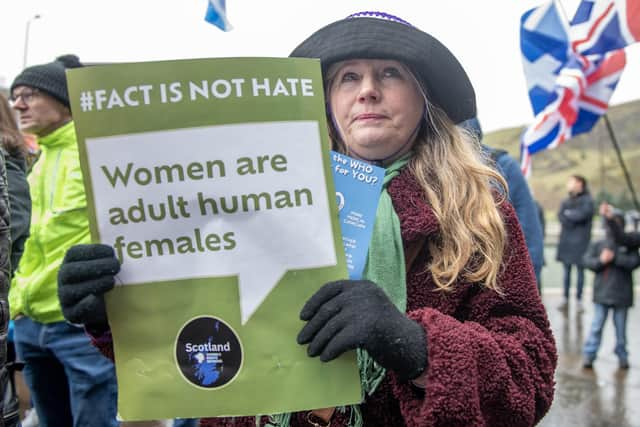Naomi Long pressing ahead with Northern Irish hate crime bill amid Scottish furore - and it may contain the same things that sparked protests in Scotland
and live on Freeview channel 276
Whilst no draft bill has been published, we already know quite a bit about its probable contents.
That’s because the Department of Justice, during Mrs Long’s previous tenure in post, set out a list of anti-hate crime measures which it has “accepted” as candidates for the bill.
Advertisement
Hide AdAdvertisement
Hide AdArguably the most controversial things about the Scottish act are that it expanded hate crime law to cover “transgender identities” (meaning any man who dresses up as a woman, and vice-versa), and it contains no “dwelling defence” (protecting people from prosecution for things they say in their own home).


The first one is almost certain to appear in any bill Mrs Long brings forward, whilst the second one is being considered (how we know all this is set out below).
TUV leader Jim Allister KC has already voiced fears about the probable shape of the bill (see below).
But before looking at its likely contents, it's important to know what the law says right now.
Advertisement
Hide AdAdvertisement
Hide Ad-
A BRIEF HISTORY OF HATE CRIME:


Arguably the UK’s first piece hate crime law was the Public Order Act 1986, which criminalised the "stirring up of racial hatred" in GB.
This never applied in Northern Ireland, but a very similar law (The 'Public Order' Order 1987) did, and remains in force today.
The NI law went further than the GB one: it also included religion as well as race and criminalised not just "stirring up hatred" but also "arousing fear" (and it has since been amended to cover sexuality and disability too).
It makes it illegal to use “threatening, abusive or insulting words or behaviour” if “hatred is likely to be stirred up or fear is likely to be aroused” against those groups.
Advertisement
Hide AdAdvertisement
Hide AdThere is a key defence: “No offence is committed where the words or behaviour are used… by a person inside a dwelling, and are not heard or seen except by other persons in that or another dwelling.”
In other words you can say what you like in your own house, or on a private phone call to another house.
A second piece of hate crime law came along in 2004 called The Criminal Justice (No2) NI Order, letting judges increase someone's sentence for a crime if it’s motivated by "hostility" towards someone's race, religion, disability, or sexuality.
And in 2011 the Justice Act (Northern Ireland) created an offence of sectarian chanting at football matches.
Advertisement
Hide AdAdvertisement
Hide Ad-
...AND WHAT IS COMING NEXT:
Then in 2019, whilst Stormont was down and there was no minister in place, civil servants tasked judge Desmond Marrinan with reviewing these laws and proposing new ones.
He issued his report in 2020 with 34 recommendations.
In 2021 Mrs Long’s department (the DoJ) declared whether or not it accepted, rejected, or wasn’t sure about each proposal.
Here are some main ones, and whether the DoJ has accepted them:
⦁ ACCEPTED: Transgender identities should be covered by hate crime law;
Advertisement
Hide AdAdvertisement
Hide Ad⦁ ACCEPTED: The law should change so that, instead of simply adding an extra punishment to a crime like assault if it was fuelled by “hostility” towards a protected group, a stand-alone hate crime should be recorded on an offender's record, not just the assault;
⦁ ACCEPTED IN PRINCIPLE: A judge should consider not just "hostility" but also "bias, prejudice, bigotry or contempt" as possible motivating factors;
⦁ FOR FURTHER CONSIDERATION: Age and sex should be added as protected characteristics;
⦁ FOR FURTHER CONSIDERATION: The "dwelling defence" be repealed, to make clear that someone sitting in their house and saying something online is covered by hate crime law. In its place should be a new "private conversation" defence. There should be "no express defences for freedom of expression in relation to religion";
Advertisement
Hide AdAdvertisement
Hide Ad⦁ ACCEPTED: The law "should be clarified to confirm that any online material downloadable in Northern Ireland is acknowledged to be within the jurisdiction of the courts" – and not just material hosted on servers in Northern Ireland;
⦁ ACCEPTED: People who have complained of a hate crime should get "special measures" in court, like not having to appear in person for cross-examination;
⦁ FOR FURTHER CONSIDERATION: There should be "a legal requirement on social media companies" for all users to "provide verifiable personal information", and social media companies should be compelled to remove certain material – though it's unclear exactly what the threshold for doing so would be.
In January 2022, Naomi Long opened up a consultation into changing the law... then shortly afterwards, Stormont collapsed again.
Advertisement
Hide AdAdvertisement
Hide AdBut when she took up office once more in 2024, she issued a statement saying hate crime legislation "needs progressed".
Asked this week when we will see a bill and what it will contain, the DoJ said the Marrinan recommendations “remain the main framework for the development of policy and legislative proposals”, adding: “The final content of the Hate Crime Bill, due for introduction in the latter half of the mandate, is yet to be decided.”
The DoJ said a second consultation on it is “due for launch shortly”.
As to what impact the Scottish furore will have, the DoJ said it is “monitoring the development and implementation of hate crime legislation in other jurisdictions”.
Advertisement
Hide AdAdvertisement
Hide Ad-
‘ASSAULT ON BASIC FREEDOMS’
A criminal barrister by profession, one of those skeptical about the new drive towards hate crime laws is TUV leader Jim Allister KC.
He said “the proposals from the justice minister are deeply concerning”.
“When one looks at what the department is thinking of, the same issues which have arisen in relation to transgenderism and biological sex will come up in Northern Ireland which have featured in Scotland,” he told the News Letter.
“Gender including transgender identity” is listed as a category which should be added to the list of protected characteristics.
Advertisement
Hide AdAdvertisement
Hide Ad“Consequently the rights of women to their own single-sex spaces is under threat and we even open up the ridiculous possibility of those convicted of rape being housed in women’s only prisons.
“Of additional concern is the Big Brother element of these proposals."
He said a removal of the private dwelling defence risked giving police the power over “what people even say in their own homes; this is overreach to a ridiculous degree and represents an unacceptable assault on fundamental freedoms”.